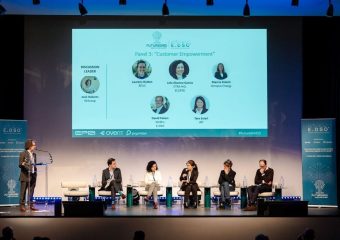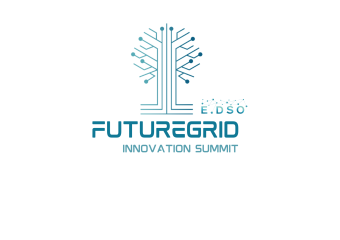E.DSO Webinar ‘DSOs & the TEN-E regulation review: leave no-one behind’ – Press release
3 March 2021
In the light of the European Commission’s proposal to revise the EU rules on Trans-European Networks for Energy (the TEN-E Regulation), E.DSO hosted a webinar gathering high-profile speakers to assess whether the revision is aligned with decarbonisation and digitalisation of the energy sector and more importantly with 2050 climate-neutrality objective of the European Green Deal.
Distribution grids have a key role to play in the energy transition. To facilitate their access to EU funding, and Connecting Europe Facility (CEF) in particular, the legislative framework must be adapted accordingly.
Opening the webinar, Mr Christian Buchel, E.DSO Chair and Director for Europe, Territories and Clients at Enedis, recalled that DSOs are the cornerstone of the energy transition. He said: “The recast of the TEN-E Regulation, which drives CEF funding, is a key opportunity to unleash the potential of distribution power grids and contribute to the energy transition.”
Mr Buchel emphasised the key findings of the Distribution grid investment to power the energy transition study, by demonstrating that power grids are critical to enable the energy transition as they are key for energy demand electrification and renewable integration in the power system. Based on the EU policies and decarbonisation targets, this study showed that for the coming decade, €400 billion are needed for power grids in Europe. Electrification and decarbonisation will require new power lines, reinforcing the existing ones and modernising the network through digitalisation.
Speaking during the webinar, Mr Christophe Grudler, Member of the European Parliament and Rapporteur of the Energy System Integration Strategy, stated that the role and responsibilities of DSOs in the recast TEN-E Regulation shall be further expanded, notably in the Ten-Year Network Development Plan (TYNDP) process. He said: “The future EU DSO Entity to be treated on equal footing as ENTSO-E along TYNDP process has more than a consultative role.”
TEN-E Regulation shall address the main investment needs in the energy system – electricity infrastructure, and in particular at distribution level, against fossil infrastructure.
Ms Aurelie Beauvais, Deputy CEO at Solar Power Europe said: “The TEN-E must make the EU power infrastructures fit for the climate-neutrality objective and preparethe grid for 100% renewable energy system.” Ms Beauvais further continued “We need to make sure that TEN-E optimises the above needs by investing into digitalisation of the grid and in coordination with the deployment of flexibility resources.”
Mr Torsten Knop, Senior Expert Regulation (E.ON), stressed that European energy system needs an accelerated electrification along with a bottom-up approach enabling energy system integration of electricity, gas/hydrogen and heat with more smart grids as the key tools for integrated planning and operation. He said: “The European Strategy on Energy System Integration will be paramount to achieve a cost-effective decarbonisation of the EU economies. In this transition, DSOs have a relevant role in building a more flexible, decentralised, and digital energy system. Thus, TEN-E is the one of the main regulations to enable relevant projects to be rightfully and easily funded, by easing Projects of Common Interest (PCIs) for application and implementation.
Smart Grids into the Projects of Common Interest (PCIs) list
Mr Tomas Sipos, Head of Regulatory Affairs at Západoslovenská distribučná, who was addressing the selection procedure and criteria for PCIs, said: “The smart grids definition in the proposed Regulation is broader and flexible enough for projects promoters to apply for projects.” Mr Sipos provided a detailed guideline about the nature of co-financed projects (studies, research, works) and benefit for gird users.
Mr Rickard Venetjoki, Political Affairs Manager (E.ON), stated that the previous provisions of the TEN-E Regulation discouraged the project promoters to use them and apply for smart grids projects. He stated: “The TEN-E Regulation must provide stimulus for investment projects. It should be also pointed out that the framework for regulatory incentives should reflect the evolving nature of the necessary investments and the costs.”
Ms Julija Vasiljevska, Scientific & technical project officer, Joint Research Centre of the European Commission, acknowledged that although there are problems in interpreting the eligible criteria, there is a lot of potential in the revised Regulation. She said: “TEN-E is the one of the main regulations to enable smart grid projects to be rightfully and easily funded, by easing PCI process for application and implementation.”
Mr Wolfgang Vittorio D’Innocenzo, Energy Attaché, Permanent Representation of Italy to the EU, clarified that unregulated businesses are not entitled to CEF funding, as opposed to regulated business (DSOs). He stated: “Smart grids are not part of the TYNDP process, but they are subjects of the parallel assessment under the PCI process. Further, in the PCI process one has to demonstrate a cross-border effect and that can be quite challenging for the local distribution grids.”
Ms Lisa Fischer, Programme Leader (E3G), stated: “TEN-E Regulation has become a key instrument for delivering an integrated and shock resilient EU energy system. With European citizen’s rising concerns over climate change, the upcoming TEN-E revision should reset its focus away from energy supply and onto climate-resilient infrastructure planning for the future.” For Ms Fischer, the TEN-E Regulation, as it stands, still priorities projects which undermine the achievement of the Union’s climate neutrality objective.
Mr Christian Buchel thanked the panelists for the very insightful and interesting discussions, and the smart, even challenging inputs they provided. He recalled the key role of NRAs in the light of the revision as mentioned during the debates. Indeed, considering tariff issues also constitute the basis of the equation at stake in the light of the TEN-E regulation review, Mr. Buchel reminded us how much tariff is important as it has to make both the investment possible in the first place, while being acceptable by the end-user. Finally, he thanked the stakeholders for their supports and the European Commission for opening and handling such a revision, especially needed for the DSOs to fulfil the European targets for energy and climate change.







